It has been an intellectually challenging couple of weeks in the Temple Jeremiah Torah study group. We are deep in the weeds of the parts of Leviticus that list rule after rule, interspersed with stories of divine punishment and retribution. Last week, with Tazria-Metzora, we talked about the rules of tzara’at, a skin affliction often translated as leprosy, which requires a complicated set of rituals involving sending the affected person outside of the camp to wait in isolation. For many of our scholars, this was hard to read. Why are we punishing someone for being sick? If someone is unwell, don’t they deserve compassion and care rather than isolation?
My argument has been that the book of Leviticus, rather than seeking to punish people, seeks to define them. After 430 years in Egypt, the newly free Israelites need to learn what their new society looks like. So many of the commandments explicitly position themselves in opposition to the habits of the the surrounding nations. To be kadosh, holy, the Israelites need a societal structure that sets them apart and makes them distinct from their neighbors. They are building hierarchy, rituals, and expectations for a coherent society. Leviticus is very concerned with categories and boundaries, and is uncomfortable with the liminal space between categories. For example, someone who has a skin lesion is considered impure until their period of isolation and sacrificial ritual are complete. But in Leviticus 13:12, we learn that someone whose entire body and all their skin is covered over with tzara’at lesions is pure. They are all one thing, no longer straddling the boundary. But this argument, too, has troubled us! Because we, as postmodern thinkers, know that people don’t fit neatly into categories and definitions. We are all many things at once. Our world does not exist in tidy black and white but rather all the shades of the rainbow. Prescriptivist definitions of human nature cannot describe all of our variety of lived experiences.
One day, when I was a b’nai mitzvah tutor in Brooklyn, a student came into my classroom and flopped moodily into the chair. When I asked how their day was, they answered, “Not good. They’re trying to define me out of existence.” This student was non-binary, and there was an ongoing debate about trans kids that has only continued to intensify. That student and that day have always stuck with me. You can’t define someone out of existence. People will always exist how they are. But what definitions can do is make known who is inside and who is outside, who has a place in society. That Levitical discomfort with boundary crossing and resistance to categorization persists, and I think we have an obligation to interrogate it so that we can be affirming communities of care.
In this week’s double Torah portion, Acharei Mot-Kedoshim, many boundaries are established. The Israelites are explicitly told not to copy the ways of the Egyptians. They are given rules for caring for the poor and the stranger and behaving fairly. And they are given lists of sexual prohibitions, including twice that man shall not lie with man as with woman. This painful verses have been weaponized for centuries, used to punish queer people. We subvert it by celebrating Pride Shabbat this week and saying boldly and proudly that Temple Jeremiah is a place where people of all gender expressions and sexual orientations are welcomed and loved. This is a place where we enable people to define themselves. We won’t try to categorize you or make you stifle your uniqueness to fit into a neat little box. The Joy of Belonging is for everyone.
In honor of Pride Shabbat, I want to close with a prayer by Rabbi Reuben Zellman, one of the first trans rabbis. We can turn the in-between, the space between categories, into a space of love.
“As the sun sinks and the colors of the day turn, we offer a blessing for the twilight,
for twilight is neither day nor night, but in-between.
We are all twilight people. We can never be fully labeled or defined.
We are many identities and loves, many genders and none. We are in between roles, at the intersection of histories, or between place and place.
We are crisscrossed paths of memory and destination, streaks of light swirled together. We are neither day nor night.
We are both, neither, and all.
May the sacred in-between of this evening suspend our certainties, soften our judgments, and
widen our vision.
May this in-between light illuminate our way to the God who transcends all categories and definitions.
May the in-between people who have come to pray be lifted up into this twilight.
We cannot always define; we can always say a blessing.
Blessed are You, God of all,
who brings on the twilight.”
Rabbi Reuben Zellman

